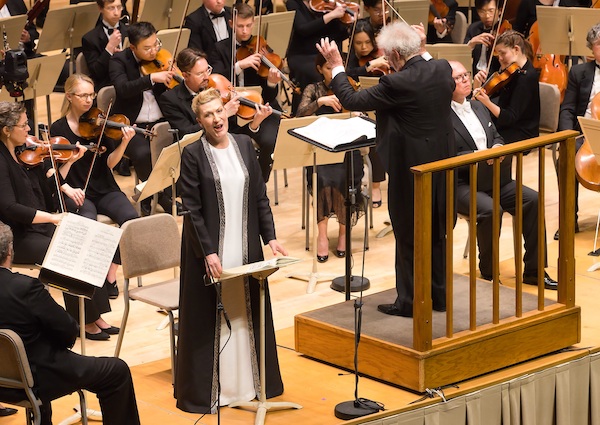Classical Concert Review: Boston Philharmonic Plays Mahler’s “Das Lied von der Erde”
By Aaron Keebaugh
Few conductors in Boston have a feel for late Mahler the way Benjamin Zander does.

Dame Sarah Connolly with Benjamin Zander and the Boston Philharmonic Orchestra performing Das Lied von der Erde. Photo: Hilary Scott
By 1909, Gustav Mahler didn’t know what to think.
Scarlet fever sent his young daughter Maria to an early grave. On top of that, a doctor had diagnosed the heart condition that would kill the composer two years later. For Mahler, death seemed omnipresent.
Considering such tragedy, his Das Lied von der Erde, with its wild, alcohol-fueled exuberance, shakes a fist in the face of fate. In the hands of Benjamin Zander, who led the work with the Boston Philharmonic Friday night, contrasting notes of loss and desolation resounded with fitting irony.
Mahler’s setting of Hans Bethge’s translation of classical Chinese poetry is at once playful and ominous. Drinking songs course with the expected zest. Lyrics about winter’s chill — a potent symbol for death — underscore a silvery lyricism that emerges and fades like fleeting memories. The concluding “Der Abschied” contemplated the earth’s beauty with Nietzschean rapture.
Zander’s swift direction channeled a rousing vitality in all the right places. The opening “Das Trinklied von Jammer der Erde” galloped with the first brass calls. Stefan Vinke had no trouble lofting his radiant heldentenor over the din. His voice was tinged with wry humor as he sang of the pains of life and the certainty of death.
In “Von der Jugend,” Vinke and the orchestra engaged in tittering banter, recalling the joyful verve of Mahler’s Des Knaben Wunderhorn. So too did “Der Trunkene im Frühling,” where Vinke sang about finding solace in the bottle as if he had stumbled on a divine instruction.
Mahler’s music, with its palpable defiance over things as they are, achieved full resonance through the performance of Dame Sarah Connolly, who continues her battle with breast cancer.
Her dark, almost Wagnerian mezzo soprano embodied the world-weary gravity of “Der Abschied.” Connolly also expressed the utter desolation of “Der Einsame in Herbst,” her lines mingling intimately with winds and strings. She warmly conveyed the sweet sorrows of love and loss in “Von der Schönheit.”
Few conductors in Boston have a feel for late Mahler the way Zander does. His bold direction could make winds and strings flutter and cry out without hampering the forward momentum of the music. Better yet, the Boston’s Philharmonic’s whisper was just as powerful as its roar — these delicate moments are indispensable way stations along Mahler’s quest for life.
Franz Schubert’s Symphony No. 8 in B minor opened the concert with a similar blend of fervor and sensitivity.
Bountiful lyricism and sudden bursts of tension in this “Unfinished Symphony” mesmerized through Zander’s sprightly tempos. The familiar themes of the Allegro moderato sang and lilted. And, while a few isolated cello lines wandered in and out of tune in the Andante, Zander cultivated a warm exuberance in a timeless — even Mahlerian — embrace of existence.
Aaron Keebaugh has been a classical music critic in Boston since 2012. His work has been featured in the Musical Times, Corymbus, Boston Classical Review, Early Music America, and BBC Radio 3. A musicologist, he teaches at North Shore Community College in both Danvers and Lynn.
Tagged: Benjamin-Zander, Boston Philharmonic Orchestra, Dame Sarah Connolly
